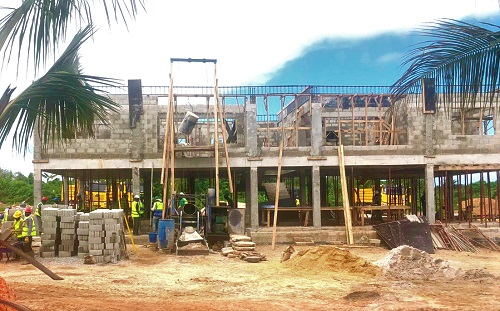Work has started to expand the Daboase water treatment plant from six million gallons of water a day to 22.4 million gallons.
The €70-million project, which is the first of the two-part water treatment facility, will enable the Ghana Water Company Ltd (GWCL) to increase the production of water to meet the growing demand of customers in the Western Region up to 2040.
The first phase, estimated to cost €70 million, is expected to be completed by the end of August 2025.
An Austria firm, Strabag, which is undertaking the construction and civil engineering works, has already moved to the site.
The contractor is currently busy with the erection of administrative buildings, a workshop, and a structure for the intake plant while clearing the land for the construction of the main building to house the water processing plant and other units.
Alongside the clearing works, the engineering team and the contractor are also putting the finishing touches on the construction and mechanical designs of the project.
The project will benefit communities such as Takoradi, Effiakuma, Kwesimintsim, Kojokrom, West Tanokrom, Anaji, Sekondi and New Takoradi.
Other areas are Essikado, Apremdo, Kweikuma, Ntankoful, Aboadze, Abuasi, Apowa, Inchaban and Ketan.
Also, Dixcove Estates, Shama, Hwindo and Hotopo and the new site, among others, will benefit.
The old plant
At a public forum to discuss findings and recommendations of a draft environmental and social impact assessment report, the Chief Manager in charge of Planning of the GWCL, Francis Agyei-Boateng, said the project would bring enormous relief to the customers.
He said the project would involve some physical displacements and relocations, extensive clearing/earthworks, excavation works, evacuation of debris and the laying of pipes, as well as decommissioning activities.
The current treatment plant, constructed in the late 1960s at Daboase with an installed capacity of 27,000m3/day (about six million gallons a day), is supported by the Inchaban treatment plant with 18,000m3/day or four million gallons of water a day.
However, the capacity of both plants is not enough to meet the demand from the Sekondi-Takoradi and adjoining districts.
Funding for the project
Mr Agyei-Boateng said the project was in line with the government’s water for all agenda being executed through the Ministry of Sanitation and Water Resources and the GWCL under the
Sekondi-Takoradi Expansion Project, with funding from Commerzbank AG, Germany.
The government, he said, in its quest to improve the economic, health and social conditions of the citizenry, was embarking on various economic, health and social conditions improvement projects throughout the country.
“One of such projects is the ongoing Sekondi-Takoradi Water Supply Expansion Project, which is to be carried out in two phases, with phase one works aimed at delivering a 100,000m3 per day (22.0MGD) Conventional Water Treatment plant,” the Chief Manager stated.
Transmission, distribution lines
Aside from the plant, Mr Agyei-Boateng said there would be the construction of about 100km of transmission and distribution pipelines to supply potable water to Sekondi and Takoradi and their environs to end the perennial water challenge due to fast-growing demands.
“The project will eventually provide domestic water meters and standpipes to cater for those who cannot directly afford household connections,” he said.
Mr Agyei-Boateng added that staff accommodation units would be added to ease staff accommodation challenges; there would also be the construction of an operational district office for effective water supply management administration and some water reservoirs.
The main objective of the project is to increase access to improved water supply service delivery for the people in the project area to reduce water and sanitation-related diseases, as well as increase economic opportunities for the inhabitants.
“The first phase project would be executed at a cost of 70 million euros and is to be completed within a period of 40 months after the project officially commenced in May 2022 and is expected to be completed in August 2025.

